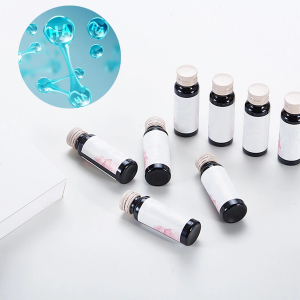| Basic Information | |
| Product name | Probiotics |
| Other names | Probiotic drop, Probiotic Beverage |
| Grade | Food grade |
| Appearance | Liquid, labeled as the customers' requirements |
| Shelf life | 1-2years, subject to store condition |
| Packing | Oral liquid bottle,Bottles,Drops and Pouch. |
| Condition | Preserve in tight containers,low temperature and protected from light. |
Description
Probiotics are made of good live bacteria and/or yeasts that naturally live in your body. You constantly have both good and bad bacteria in your body. When you get an infection, there’s more bad bacteria, knocking your system out of balance. Good bacteria helps eliminate extra bad bacteria, returning the balance. Probiotic-supplements are a way to add good bacteria to your body.
Function
The main job of probiotics, or good bacteria, is to maintain a healthy balance in your body. Think of it as keeping your body in neutral. When you are sick, bad bacteria enters your body and increases in number. This knocks your body out of balance. Good bacteria works to fight off the bad bacteria and restore the balance within your body, making you feel better.
Good bacteria keeps you healthy by supporting your immune function and controlling inflammation. Certain types of good bacteria can also:
Help your body digest food.
Keep bad bacteria from getting out of control and making you sick.
Create vitamins.
Help support the cells that line your gut to prevent bad bacteria that you may have consumed (through food or drinks) from entering your blood.
Breakdown and absorb medications.
Some of the conditions that might be helped by increasing the amount of probiotics in your body (through food or supplements) include:
Diarrhea (both diarrhea caused by antibiotics and from Clostridioides difficile (C. diff) infection).
Constipation.
Inflammatory bowel disease (IBD).
Irritable bowel syndrome (IBS).
Yeast infections.
Urinary tract infections.
Gum disease.
Lactose intolerance.
Eczema (atopic dermatitis).
Upper respiratory infections (ear infections, common cold, sinusitis).
Sepsis (specifically in infants).
From Cleveland Clinic, Probiotics
Applications
1. For babies with poor digestive function, supplement probiotics as appropriate, which can improve gastrointestinal digestive function and prevent diarrhea and constipation;
2. People with functional diarrhea or constipation;
3. Tumor patients receiving chemotherapy or radiotherapy;
4. Patients with liver cirrhosis and peritonitis;
5. Patients with inflammatory bowel disease;
6. People with indigestion: If you have long-term poor gastrointestinal function and indigestion, you can quickly restore gastrointestinal function through probiotics and speed up the recovery of your body;
7. People with lactose intolerance or milk allergy;
8. Middle-aged and elderly people: The elderly have reduced physical function, declining organ function, and insufficient gastrointestinal motility. Proper supplementation of probiotics can improve intestinal digestion and absorption, which can greatly reduce the probability of illness.










